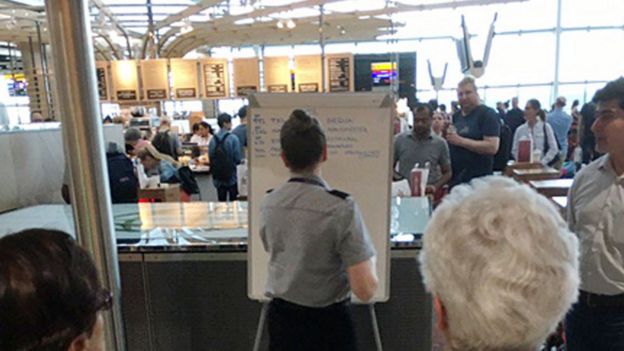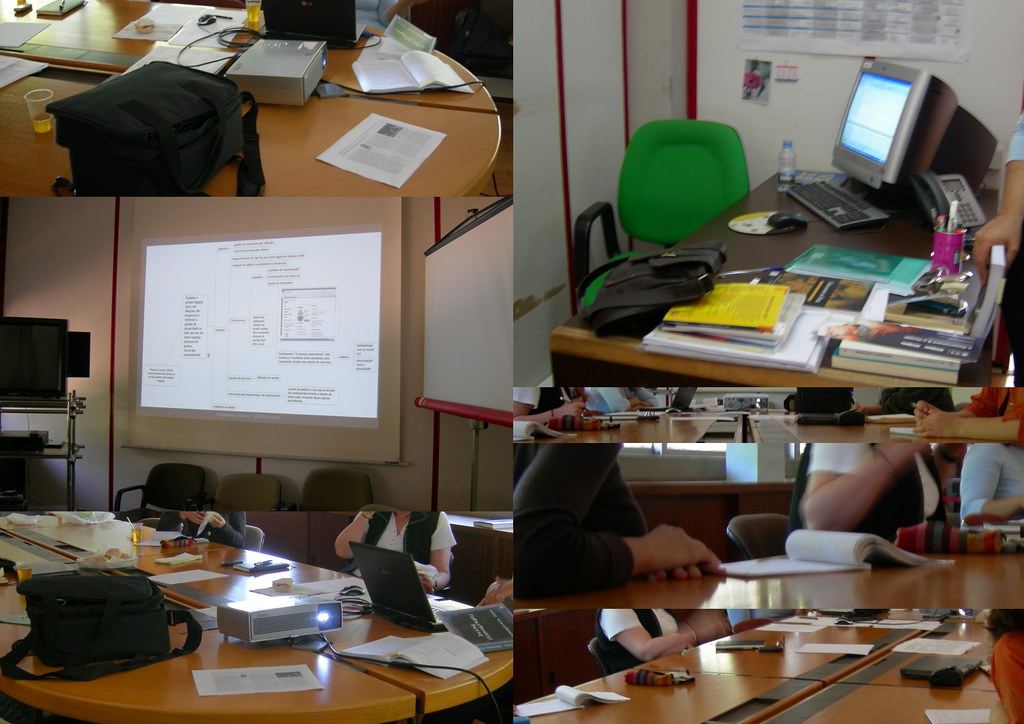
"More than conversation at the interface, it is creative assemblages like these that explore and elaborate the particular dynamic capacities that digital media afford and the ways that through them humans and machines can perform interesting new effects (...) in uniquely particular ways." Lucy Suchman (2009). Human-machine reconfigurations: plans and situated actions.
Showing posts with label information artefacts. Show all posts
Showing posts with label information artefacts. Show all posts
May 28, 2017
Oct 8, 2015
information fragmentation
M. Kljun, “The information fragmentation problem through dimensions of software, time and personal projects,” Ph.D. dissertation, Lancaster University, 2013.
"The findings show (i) the extensive information fragmentation in each individual PIM tool besides cross-tool fragmentation, (ii) the information overload preventing focusing on the subset of fragmented project related information and changing focus over time, and (iii) the importance of support information (information scraps) and its integration into project flow." [pdf]
by
Monica Pinheiro
0
comments
 Labels:
fragmentation,
information artefacts,
information overload,
PIM
Labels:
fragmentation,
information artefacts,
information overload,
PIM
Nov 19, 2013
Reconfiguring working spaces
Pinheiro, M., Barrulas, M. J., and Carvalho, J. A. (2013). Role of artifacts for reconfiguring working spaces and information systems. In Conferência Associação Portuguesa Sistemas de Informação. CAPSI:
"Individuals, like organizations, need to manage information for work (and non-work) related activities, on a daily basis. In order to extend their communication and fulfill information needs, people use artifacts (man made objects), that became increasingly technological, and in turn, these very technological artifacts are increasingly more dependent upon other supporting technologies, widely referred as infrastructures. In order to design information systems that support workers’needs, what do we know about their use of artifacts? Across time? Inside and outside their organizations? And on the move?"
Sep 15, 2013
Accepted
«We are pleased to inform you that your submission to the Internet Technologies & Society 2013 Conference (ITS 2013) has been accepted as a "Full Paper"»:
Pinheiro, M., Cardoso, M., Barrulas, M. J., and Carvalho, J. A. (2013). Some things I tend to overlap even if not necessary. A discussion on PIM artifacts between researcher and research agent. In International Conference on Internet Technologies & Society.
by
Monica Pinheiro
0
comments
 Labels:
conference,
information artefacts,
information systems,
ITS2013,
Malaysia,
paper,
PIM
Labels:
conference,
information artefacts,
information systems,
ITS2013,
Malaysia,
paper,
PIM
Oct 30, 2012
information artefacts on the move
The social life of information: displays of information artefacts in a small event. From personal workspace to event workspace and back. «Memory of the event» created and shared between participants: web object with embedded information used in the event, meta data about used information, summary of talk, and visual memory. Ciclo de Seminários sobre Estudos de Informação, June 14, 2009, Instituto Nacional de Engenharia, Tecnologia e Inovação, Lumiar, Portugal. Image by Monica Pinheiro, license CC BY-NC-SA (CC)
Feb 16, 2011
Communication history in stamps
Historical narratives of information artefacts, in a collection curated by Kees de Graaff, Communication: a history in stamps.
Feb 14, 2011
Information as thing
In accordance with the view of information as thing by Buckland (1999), the article by Jones, W. (2010, No knowledge but through information, First Monday, vol. 15 (9-6), September) brings back the arguments of the need to operate/manage information items and not knowledge: "Knowledge is not a thing to be managed directly. Knowledge is managed only indirectly through information". His view is directed to show that Personal Knowledge Management (PKM) should be viewed as a subset o Personal Information Management (PIM) and not as a higher level approach.
"The ways in which an item is manipulated will vary depending upon its form and the tools available for this form. The tools used for interaction with paper–based information items include, for example, paper clips, staplers, filing cabinets and the flat surfaces of a desktop. In interactions with digital information items, we depend upon the support of various computer–based tools and applications such as e–mail applications, file managers, Web browsers, and so on. (...) Knowledge as ‘no thing’ cannot be managed directly. If we think we have knowledge ‘at our fingertips’ we are most likely touching information in some form instead. This is not to say that knowledge management is not possible. But we do so through its expression in information. There is no management of knowledge except through the management of information."
In his paper he also evokes a pictorial representation of "[i]nformation management activities viewed as an effort to establish, use and maintain a mapping between needs and information. ["illustration was done by Elizabeth Boling and is a variation of a figure that first appeared in Jones (2008)."]
Could not help myself recalling the nonsense of 'knowledge management' by Tom Wilson (2002), which as always provoked great discussions and food for thought in my journey.
Subscribe to:
Comments (Atom)

